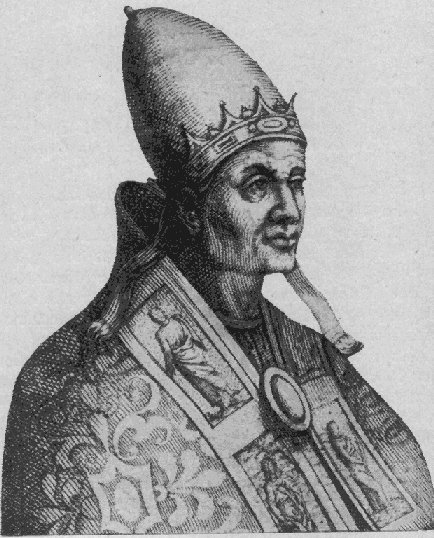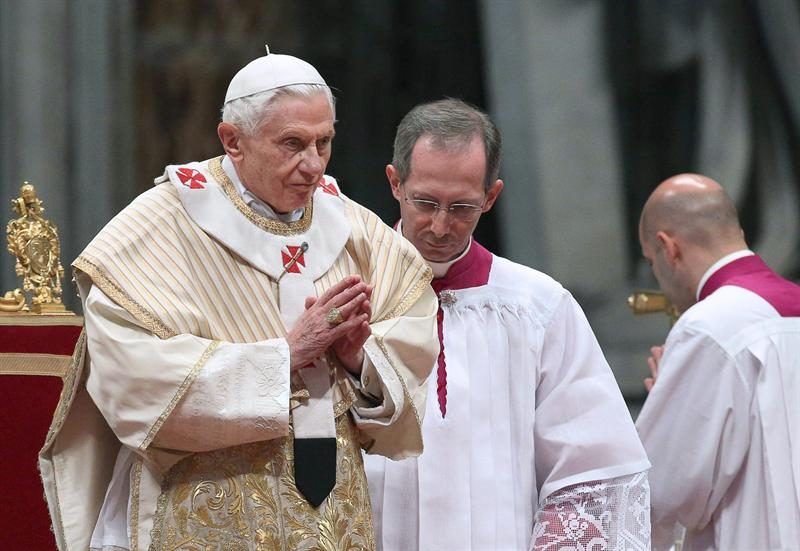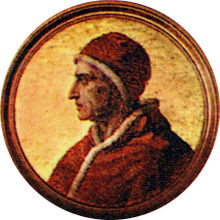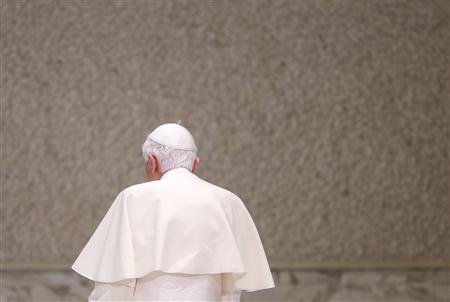 |
| Coronation of St Celestine V |
The coronation of the Pope can take place in any number of locations. Some say it was always at St. Peter's, while others indicate that Popes were crowned at St. John Lateran. Leo XIII and Benedict XV were crowned in private ceremonies in the Sistine Chapel. Pius VII was crowned in exile using a tiara of paper mache at San Giorgio's in Venice. In recent memory the Papal Coronation, and the new rite inauguration, has taken place in St. Peter's Square. Pius XII and John XXIII were crowned on the balcony overlooking the square, while Paul VI, who held the Mass on the steps of the Square, was crowned at the throne erected in front of the doors to the Basilica.
 |
| Benedict VIII wearing an early tiara made of cloth with one crown |
It is worth saying a few words about the tiara itself. The origins of the Papal tiara are unclear, though the bright thinkers over at Wikipedia seem to believe it rooted in Anatolian headware. Pope Constantine mentions a Byzantine hat called a camelaucem in the eighth century. Either way, it was likely some sort of secular apparel, that is, it was not used during Mass or the Divine Office or other manner of liturgical function. It could have been used in processions, simply as a headpiece distinct to the Papal office, but still with a practical function. By the ninth century a crown appears at the bottom of it, as is seen in coins depicting Sergius III and Benedict VII. Around this time bishops start wearing imitations of the tiara made of softer material with hard lining that can be collapsed and re-opened, the bishop's mitre! This would also suggest that the tiara had come to enjoy some sort of liturgical significance, if bishops were modelling their own liturgical dress after something the Pope wore. Again, perhaps in processions or before and after Mass. New crowns were added in the following centuries and the style became shorter during the baroque period. Despite use of the tiara, which had taken on both political and religious meaning during the "Age of Faith," the Pope adopted use of the bishop's mitre for Mass and the Divine Office.
Back to our coronation! The Pope and his ministers make their way to the place of coronation and the Pontiff seats himself in a throne erected for the occasion. The Dean of the College of Cardinals sings a few short versicle prayers followed by a Pater Noster in silence followed by a short collect. The Pope's mitre is removed, the tiara is given to proto-deacon (senior most), who places it on the head of the Pontiff with the words:
Accipe tiaram tribus coronis ornatam, et scias te esse patrem principum et regum, rectorem orbis in terra vicarium Salvatoris nostri Jesu Christi, cui est honor et gloria in saecula saeculorum.
Receive the tiara adorned with three crowns, and know that you are father of princes and kings, ruler of the world, vicar on earth of our Savior Jesus Christ, Whose is the honor and the glory for ever and ever.
After some silence, or in practice, applause, the Urbi et Orbi blessing would be announced to those gathered. The Pope with the tiara, would then give the fourt-part urbi et Orbi blessing, with the people kneeling for the final part. At this point the Papal Coronation has ended and the new Pontificate begins in earnest!
1939 coronation of Pius XII
One can also see an old news reel of Paul VI's coronation here: http://www.criticalpast.com/video/65675039162_Pope-Paul-VI_Pope-Paul-VI-Coronation_Chair-of-Saint-Peter_Saint-Peter%E2%80%99s-Square


